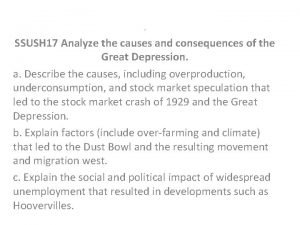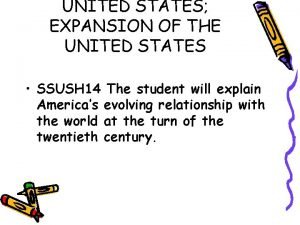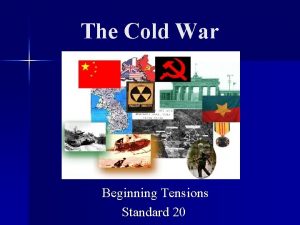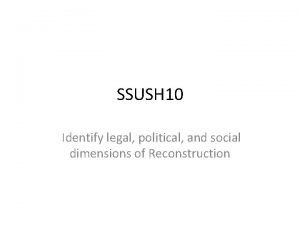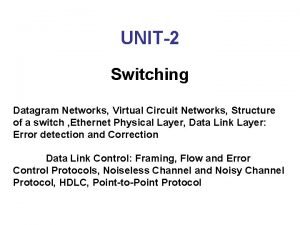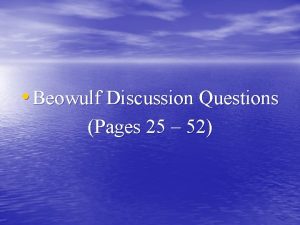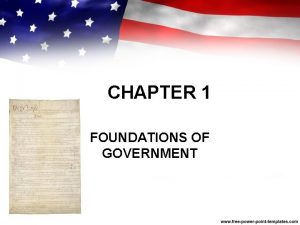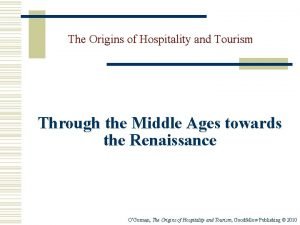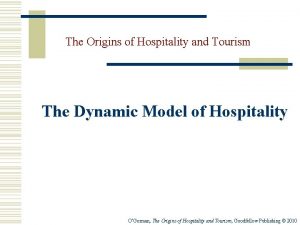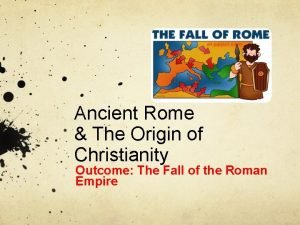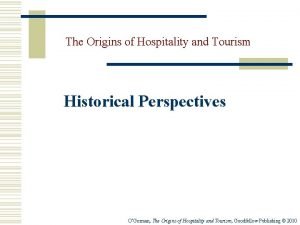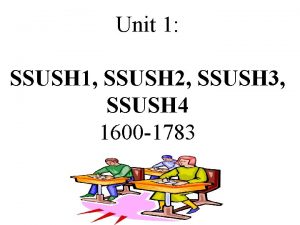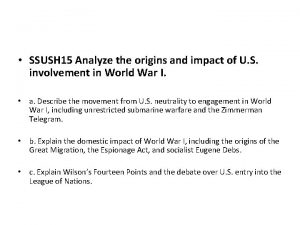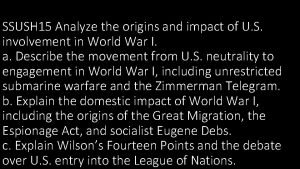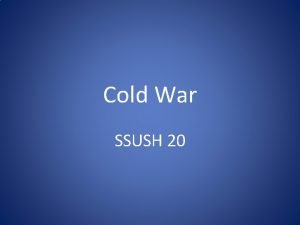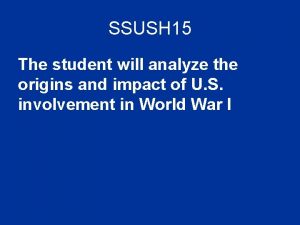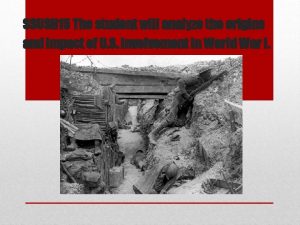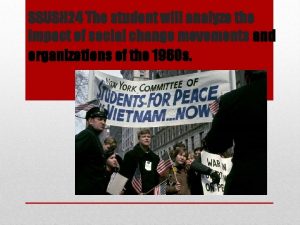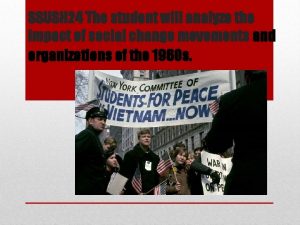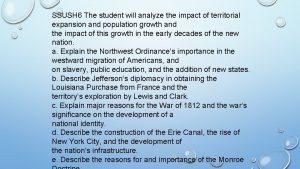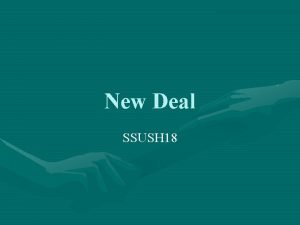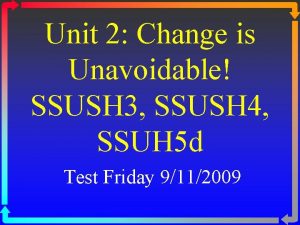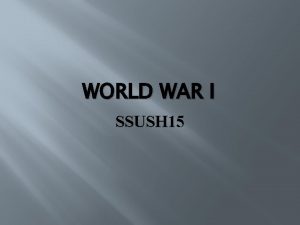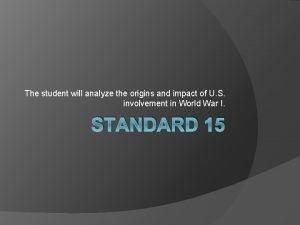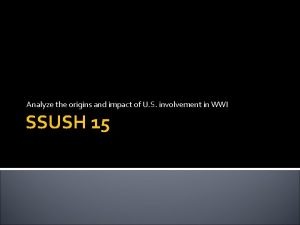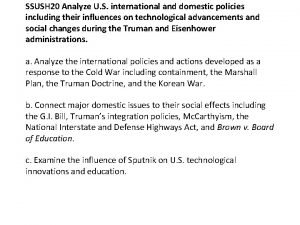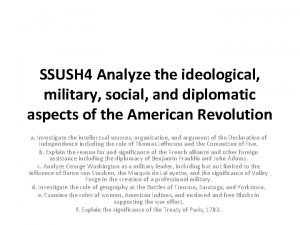SSUSH 15 Analyze the origins and impact of



























- Slides: 27

SSUSH 15 Analyze the origins and impact of U. S. involvement in World War I

Isolationism and Neutrality -While Europe was at war, the U. S. continued to hold to its policy of isolationism and neutrality by not getting involved in affairs of Europe or other nations. -To make sure the U. S. stayed out of WWI as it was being fought in Europe, Pres. Wilson issued a declaration of neutrality to officially let the world know the U. S. would not participate in this war. -Even with the declaration of neutrality, the U. S. still loaned money to Allies and American businesses sent supplies to Britain.

Causes of American Entry into WWI -Unrestricted submarine warfare by the Germans attacked both Allied warships and any commercial ships belonging to neutral countries. -Germany sank the merchant ship, Lusitania, which killed 128 Americans. -Zimmerman Note, which threatened American security and violated Roosevelt Corollary, was sent by Germany to Mexico to ask them to help defeat the U. S.

U. S. Declares War • -WWI led to increase in power of the federal government and change in the demographics of the U. S. • -Government created wartime boards that managed business and factories to meet military needs. • -U. S. borrowed money from citizens by selling "Liberty Bonds". • -U. S. increased income and excise taxes. https: //youtu. be/DHn 1 Egt 6 Xdg

Domestic Issues The U. S. increased the power of the government by passing laws that prohibited people from speaking out against the war. Pre. Wilson stated that every man would pay a penalty for non-conformity (criticizing the war) Congress passed Espionage Act which punished people for spying, sabotaging, or obstructing the war effort. The Supreme Court case decision in Schenck vs. the U. S. enforced the Espionage Act by stating the U. S. government can restrict the first amendment right to freedom of speech when there is a clear and present danger to national security.

Espionage Act Eugene V. Debs, a socialist, was arrested for speeches against the war and sentenced to prison. The trial of Sacco and Vanzetti was influenced by government fears and restrictions on immigration. These two immigrants, who were open critics of government, were tried and executed for robbery and murder, even without evidence that proved guilt. The trial shocked angered many Americans who believed they were innocent.

Great Migration • -Great Migration of 1. 5 million African-Americans moving from the South to northern cities to work in the factories. • Immigration was temporarily suspended during the war due to fears, so more jobs were opened up to blacks and women. https: //youtu. be/g. Ab 4 y. EZav. CQ https: //youtu. be/Ymo. TJu 2 i. Ofc


Results of World War I War ended with Treaty of Versailles. It blamed Germany for the war and forced them to pay reparations. It also stripped Germany of its territory. Pres. Wilson proposes his Fourteen Points in efforts to bring lasting peace in the world. Treaty of Versailles included a League of Nations, but Americans opposed it fearing that it would take away our sovereignty (power as a nation to make our own decisions) and force U. S. into future European conflicts. U. S. never joined the League of Nations.

The Treaty of Versailles • The Treaty was signed by Germany in 1919, and punished Germany for “starting” the war • Germany would have to: -dismantle their army and navy -pay war reparations of $33 billion (which they did not have) -Admit guilt for causing the war -Germany was not allowed to place any troops in the Rhineland, the strip of land, 50 miles wide, next to France. -The Treaty left Germany in shambles Most of Wilson’s Fourteen Points were dismissed by the other

League of Nations • Wilson’s League of Nations was voted down by the U. S. Congress in 1920. • Many Congressmen worried that it made the U. S. too involved in European affairs

SSUSH 16 Investigate how political, economic, and cultural developments after WWI led to a shared national identity.

Communism Revolution in Russia led to the creation of a dictatorship in which workers shared the means of production and distribution. This socialist revolution led to a more extreme form called communism which called for an overthrow of capitalism. Americans’ fear of communism eventually led to efforts to defend the U. S. from its spread. This fear of communism was called the first Red Scare.

Communism Because communism appealed to workers, the ideas of it infiltrated labor unions. Labor union leader Eugene V. Debs, the Socialist Party’s presidential candidate in 1904, 1908, and 1912, was convicted for hindering military recruiting by making a speech against it; he was sentenced to 10 years in prison. He was also permanently forbidden to vote.

Palmer Raids (a series of raids by the FBI against suspected anarchists and communists) and immigration restriction (like the National Origins Act that set limits on the number of immigrants who could enter the U. S. ) began to prevent further attacks in the U. S. by those who opposed the system of American government. Racism, discrimination, and anti-immigrant sentiment spread throughout the nation as a result of fear. Red Scare was perceived by many to be a threat to the very foundations of the U. S. https: //youtu. be/8 v. U 0 Ld. SYB 84

18 th and 19 th Amendments: One result of the 18 th Amendment that prohibited the sale and distribution of alcohol was the rise in organized crime (rise of the Mafia). Later, the 21 st Amendment repealed (overturned) the 18 th Amendment so that the government could place taxes on liquor. Speakeasies (secret clubs and bars that sold liquor) and bootleggers (illegal liquor sellers and makers) profited from illegal alcohol sales. https: //youtu. be/_CE 4 u 6 j. I_rc

18 th and 19 th Amendments: 19 th Amendment enfranchised women who had been fighting since the Seneca Falls Convention in the early 19 th century era of reform. Suffrage was finally granted after women’s economic contribution to the war effort during WWI.

ROARING TWENTIES 1920 s was a time of increased consumerism (desire of buyers to purchase an increasing amount of goods) due to opportunities to now purchase goods on credit. New products were introduced through creative advertising to the American public, including cars and household appliances. https: //youtu. be/ud_x. U 3 wit-8

Henry Ford was the developer of the first mass production of automobiles. He used assembly lines to quickly build cars. Due to improved production methods, prices dropped and the average American could now afford a car. More people began to move to the suburbs now that they had cars. Increases in the number of cars also led to the need for more highways, roads, and new businesses like motels, gas stations, and restaurants.


Radio and Movies Post-WWI marked the beginning of mass media (commercial radio and movies) and this rise of mass media was a unifying force in the national culture. -Radio included news, stories, and advertising. Movies were big business that helped establish new popular culture and celebrities. Radio and movies were a unifying force in national culture.

The 1920’s Popular Culture:


The Harlem Renaissance

Harlem Renaissance The 1920 s was also the age of the Harlem Renaissance. This was the first significant artistic movement from black culture that impacted the entire nation. Art, literature, music, dance, and the Jazz Age were all elements of the Harlem Renaissance. Jazz originated by African-Americans in New Orleans and became the major music genre of the Roaring Twenties.

Artists and performers included Langston Hughes, Duke Ellington, Zora Neal Hurston, and Louis Armstrong were famous during this age where blacks were not allowed to attend the Cotton Club, except as performers on stage to entertain whites. https: //youtu. be/mo. P 6 is. Ew. DW 8 https: //youtu. be/w. Zabp. O 4 -n. J 0? t=98

Langston Hughes I, Too, Sing America I am the darker brother. They send me to eat in the kitchen When company comes, But I laugh, And eat well, And grow strong. Tomorrow, I'll be at the table When company comes. Nobody'll dare Say to me, "Eat in the kitchen, " Then. Besides, They'll see how beautiful I am And be ashamed– I, too, am America.
 Ssush
Ssush Ssush
Ssush Ssush
Ssush Ssush
Ssush Ssush
Ssush Ssush
Ssush Ssush
Ssush Hamstring insertions and origins
Hamstring insertions and origins Virtual circuit switching example
Virtual circuit switching example Where did christianity originate
Where did christianity originate Is beowulf italicized
Is beowulf italicized How do the origins of folk and popular culture differ?
How do the origins of folk and popular culture differ? Folk culture origins
Folk culture origins Lesson 1 purposes and origins of government answer key
Lesson 1 purposes and origins of government answer key The origins of hospitality and tourism
The origins of hospitality and tourism The origins of hospitality and tourism
The origins of hospitality and tourism Ancient rome and the origins of christianity
Ancient rome and the origins of christianity The origins of hospitality and tourism
The origins of hospitality and tourism Hình ảnh bộ gõ cơ thể búng tay
Hình ảnh bộ gõ cơ thể búng tay Ng-html
Ng-html Bổ thể
Bổ thể Tỉ lệ cơ thể trẻ em
Tỉ lệ cơ thể trẻ em Gấu đi như thế nào
Gấu đi như thế nào Chụp phim tư thế worms-breton
Chụp phim tư thế worms-breton Hát lên người ơi
Hát lên người ơi Môn thể thao bắt đầu bằng chữ đua
Môn thể thao bắt đầu bằng chữ đua Thế nào là hệ số cao nhất
Thế nào là hệ số cao nhất Các châu lục và đại dương trên thế giới
Các châu lục và đại dương trên thế giới
